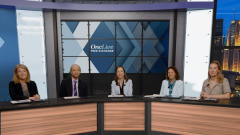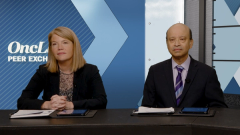
Adjuvant Therapy Options in HER2+ eBC and Clinical Data on the PH Regimen
Virginia G. Kaklamani, MD, DSc, and Melinda L. Telli, MD, review the various adjuvant therapy options available for patients with HER2+ early breast cancer based on stage, risk status, and whether or not they had received neoadjuvant therapy, and then touch on clinical data supporting the use of fixed-dose pertuzumab/trastuzumab (PH) in this setting.
Episodes in this series

Transcript:
Sara Hurvitz, MD: Back to what we’re using in clinical practice. Virginia, take us through our standard of care, based on NCCN [National Comprehensive Cancer Network] Guidelines. What should we be doing in the adjuvant setting?
Virginia G. Kaklamani, MD, DSc: Assuming a patient hasn’t received neoadjuvant therapy and they’re coming in after surgery, the NCCN Guidelines are relatively vague as to whether to give trastuzumab-based chemotherapy in small tumors. But they say we should consider it for T1a and T1b disease. This is based on data coming from the Netherlands looking at a prospective cohort of patients, [where the] T1b patients receiving trastuzumab have better outcomes. There was a suggestion that T1a patients also did.
I consider that when I talk to my patients. I recommend it for my patients with T1b disease, and I discuss it with my patients with T1a. For T1c, adjuvant trastuzumab-based chemotherapy is considered standard. Most of us will use the APT [adjuvant paclitaxel-trastuzumab] regimen with weekly paclitaxel and a year of trastuzumab. NCCN guidelines say we should then consider pertuzumab in N1 tumors, which is important. Also, in HER [human epidermal growth factor receptor 2]–positive higher-risk tumors, consider neratinib as well for extended endocrine therapy.
Sara Hurvitz, MD: That sounds good. That’s very clear. Melinda, let’s dive a little deeper into the use of pertuzumab and the data supporting the use of pertuzumab.
Melinda L. Telli, MD: This was an interesting story in breast cancer because the drug got approved about 10 years ago in the preoperative setting. It was an accelerated approval based on phase 2 trials showing increase in the rate of pCR [pathologic complete response] with the addition of pertuzumab to chemotherapy and trastuzumab. A few years later, we finally saw the approval of pertuzumab in the adjuvant setting. Initially it was somewhat unclear which patients were going to benefit.
APHINITY was a large, very standard adjuvant study. It’s the kind of study we don’t see too much anymore. Patients had surgery up front. [There were] nearly 5000 patients, and they had the choice of an anthracycline-taxane-based chemotherapy backbone with trastuzumab or the docetaxel-carboplatin regimen with trastuzumab. They were randomized to receive pertuzumab or not. When the study was first reported, there was a small benefit in invasive disease-free survival of about 1.6%. It has been subsequently updated at the 6-year time point and most recently at the 8-year time point, showing that there’s just under a 3% benefit in the overall population. It approaches 5% in the lymph node–positive [population]. At this point, there isn’t any impact on overall survival. It’s an invasive disease-free survival benefit and supports the use in node-positive disease.
Transcript edited for clarity.








































